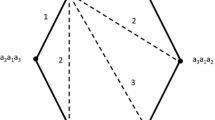Abstract
Political theory distinguishes between two concepts of representative democratic decisions. Under the first concept, representatives do not decide issues as independent individuals but merely reflect the ‘will’ of their constituencies; under the second, the decisions are made by the elected representatives themselves on the basis of their independent judgments on political issues. In the literature of democratic choice, the first concept has been formalized by Murakami, Fishburn, Pattanaik among others, in terms of decision procedures where the representative is identified with the preference-pattern emerging from the aggregation of the preferences of individual voters in a given constituency. Here we formalize the second type of representative democracy and show that it comes into conflict with certain essential features of a democratic group decision rule. In particular decisiveness and monotonicity are violated. The violation of monotonicity is of particular significance because it has come to be regarded as one of the fundamental principles for the ethical acceptability of democratic decision procedures.
I am also grateful to the University Grants Commission of India for the financial assistance in carrying out this study.
Similar content being viewed by others
Bibliography
Arrow, K. J., Social Choice and Individual Values, Wiley, New York, 1963.
Bentham, J., Plan of Parliamentary Reform, London, 1817.
Burke, E., ‘Letter to Samuel Span, esq., Master of the Society of Merchants Adventurers of Bristol’, in The Works of Right Honourable Edmund Burke, Little Brown, 1865.
Canavan, F. P., The Political Reason of Edmund Burke, Duke University, 1960.
Farquharson, R., Theory of Voting, Blackwell, 1969.
Fishburn, P. C., ‘The Theory of Representative Majority Decision’, Econometrica 39, No. 2 (1971).
May, K. O., ‘A Set of Independent Necessary and Sufficient Conditions for Simple Majority Decision’, Econometrica 20, (1952).
Mill, James, ‘Summary Review of the Conduct and Measure of the Seventh Impartial Parliament’, Parliamentary Review for 1826, London, 1826.
Mill, James, An Abridgement on the Article on Ballot, London, 1831.
Mill, John, S., ‘D. Tocqueville on Democracy in America’, London Review 2 (1835).
Murakami, Y., ‘Formal Structure of Majority Decision’, Econometrica 34 (1966).
Murakami, Y., Logic and Social Coice, Dover, 1968.
Pattanaik, P. K., Voting and Collective Choice, Cambridge, 1971.
Pattanaik, P. K., ‘On the Stability of Sincere Voting Situations’, Mimeographed, 1971: J. of Econ. Theory, 6, No. 6 (1973).
Schumpeter, J. A., Capitalism, Socialism and Democracy, Unwin, 1966.
Sen, A. K., Collective Choice and Social Welfare, Holden-Day and Oliver-Boyd, 1970.
Author information
Authors and Affiliations
Additional information
I wish to acknowledge my great debt to Professor Prasanta K. Pattanaik, my supervisor, both for initiating me to this problem and for his invaluable comments, criticisms and guidance. The paper acquired much of its present status through the discussions I had with him. Responsibility for any error, of course, rests with me.
Rights and permissions
About this article
Cite this article
Sengupta, M. On a concept of representative democracy. Theor Decis 5, 249–262 (1974). https://doi.org/10.1007/BF00164717
Issue Date:
DOI: https://doi.org/10.1007/BF00164717




